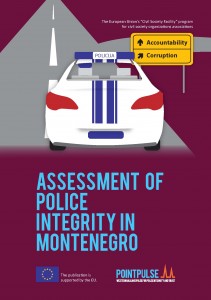2015 ASSESSMENT OF POLICE INTEGRITY IN MONTENEGRO
2015 ASSESSMENT OF POLICE INTEGRITY IN MONTENEGRO
Author(s): Dina Bajramspahić, Mario Sošić
Subject(s): Governance, Security and defense, Corruption - Transparency - Anti-Corruption
Published by: BCBP Beogradski centar za bezbednosnu politiku
Keywords: police integrity; Montenegro; police sector; corruption
Summary/Abstract: The integrity of the police in Montenegro has been compromised. The problems of bribery and misuse of office do not stand alone; there is also excessive use of force, passive professional behavior, extortion of statements, and political activity. Corruption is the second most common association of Montenegrin citizens when they are asked about the police, right after “security, safety and the protection of citizens,” and only 12 percent of the citizens believe that corruption does not run rampant in the police force of Montenegro. For the above reasons, the integrity of the police must become one of the priority areas of strategic further development of this service. There is a complex system of internal and external control of the police, which is characterized by insufficient cooperation and information exchange between the authorities in charge of oversight, insufficient effects of their controls, conclusions and recommendations, and by the citizens’ dilemma concerning the right authority to which to report abuse, corruption or overstepping of police powers, resulting from presence of too many actors. Although some progress has been made, supervisory authorities have not yet achieved necessary efficiency in the implementation of their powers. Reform of the Montenegrin police began shortly before the referendum on independence, through the enactment of the new Law on Police in October 2005. The Law on Internal Affairs of 2012 brought the Police Directorate back under the aegis of the Ministry of Interior, which resulted in reduced independence of the police concerning management and decision-making in many areas, from human resources and finance, to transparency. In this report we have presented the results of a study which aims to contribute to the improved functioning of the police, and increase the public trust and confidence in its work, which - as in all the Balkan countries – stands at quite a low level. The report is divided into six thematic sections: the first three relate to the issues of transparency, depoliticisation and management of human resources. The following three chapters deal with financial management and public procurement and the repressive measures for establishing the liability of employees, and analyze the work and results of all the actors in charge of internal and external control of police work. Each chapter is followed by recommendations for improvement within the specific area.
Series: BCBP - Assessment of Police Integrity
- Page Count: 68
- Publication Year: 2015
- Language: English
- Content File-PDF

